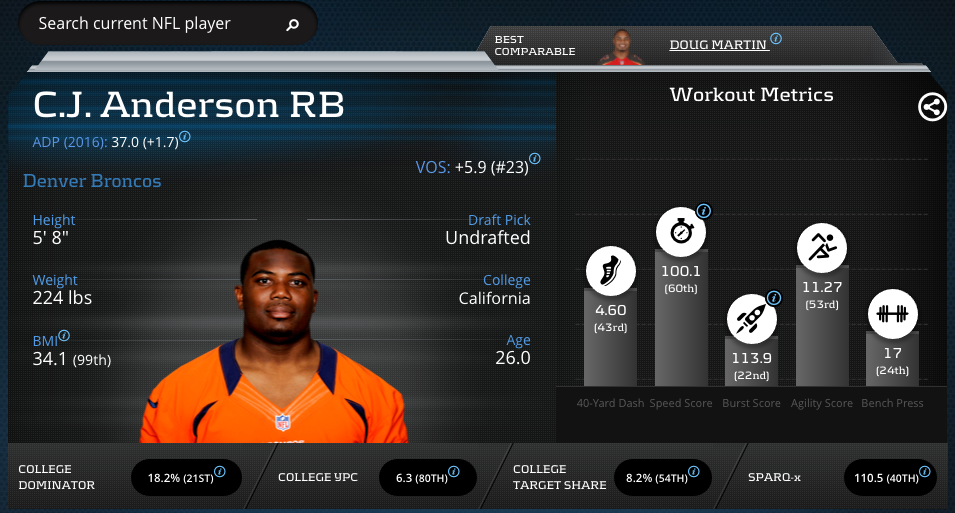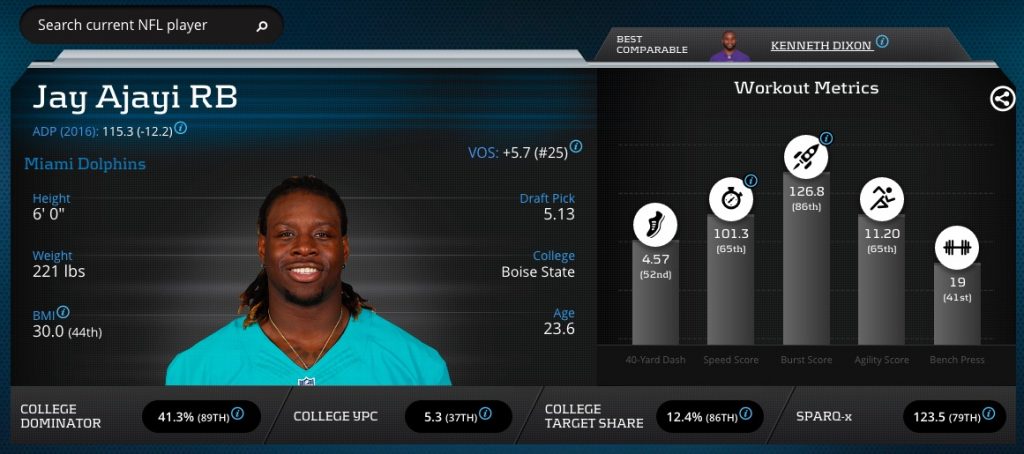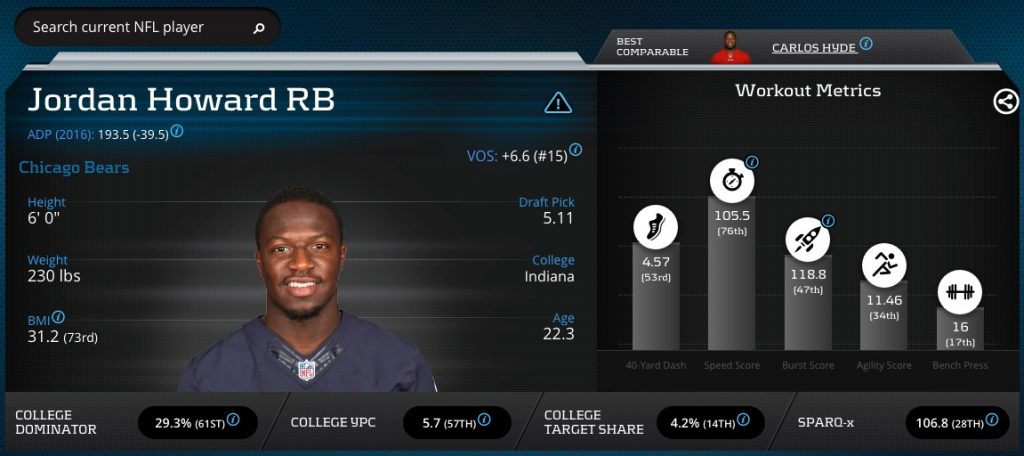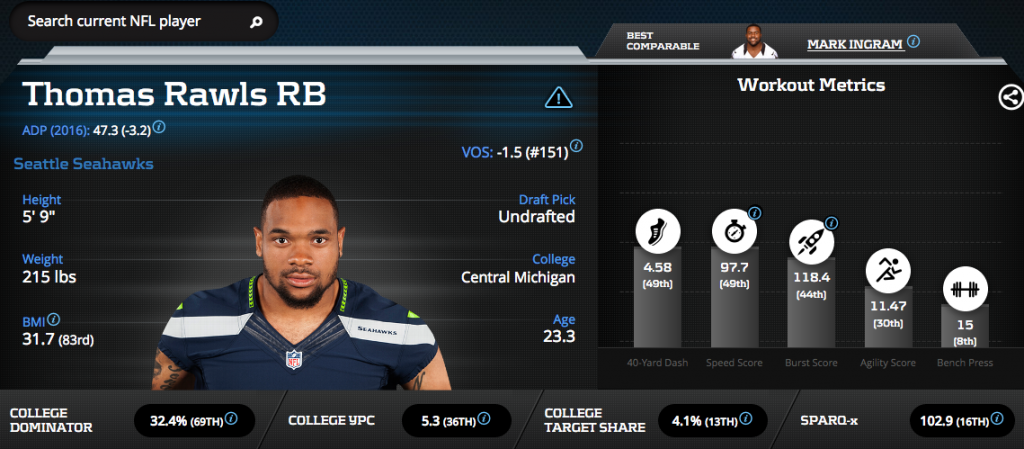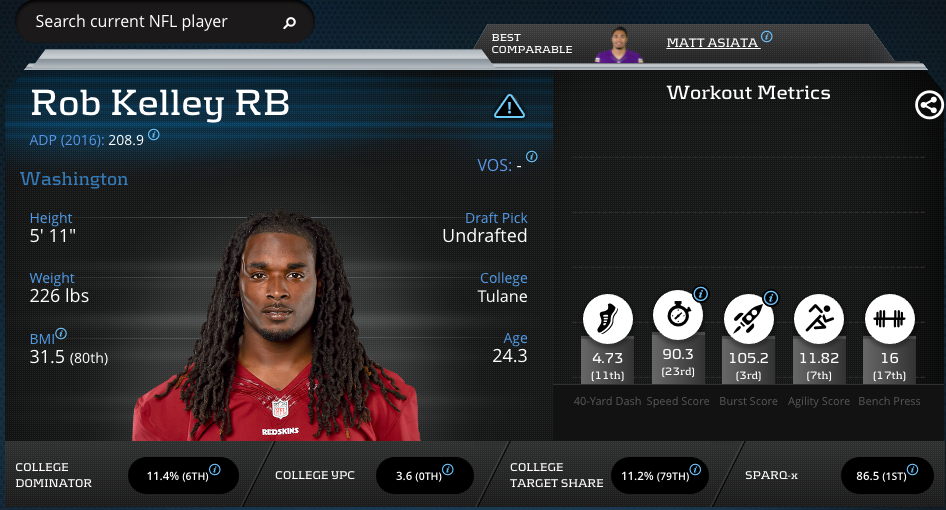Before the 2016 NFL season, we identified Lamar Miller as a fake bell-cow, as in a running back that is assumed to be productive based on an expected increase in carries, despite lacking the athletic profile of a running back who is built to handle over 300 touches in a season. Lamar Miller is also a “dude-guy,” as in a guy who doesn’t possess overly impressive athleticism, and will need to depend on his offensive line and team situation for fantasy production. The five backs listed below can each be classified as both fake bell-cows and dude-guys who are going to be overdrafted next season based on their production this year.
C.J. Anderson, RB, Denver Broncos
C.J. Anderson fits the profile of a fake bell-cow and completely owns his dude-guy status with classic dude-guy measurables, including a 4.60 40-Yard Dash (43rd-percentile), 100.1 Speed Score (60th-percentile), 113.9 Burst Score (22nd-percentile), 11.27 Agility Score (53rd-percentile), and 110.5 SPARQ-x Score (40th-percentile). Anderson also posted a meager 18.2-percent College Dominator Rating (21st-percentile), and despite his BMI being at 34.1 (99th-percentile), it hasn’t prevented him from missing 8 games over the past two seasons due to injury.
Despite these factors, C.J. Anderson was projected as a top-10 fantasy running back in the industry in 2015 and 2016, simply because it was assumed he would get the lion’s share of touches on an offense that is primarily run-based. With a -4.7 Production Premium (No. 45) in 2015 and a -10.1 Production Premium (No. 52) in 2016, Anderson has been a major disappointment to anyone who burned a 2nd or 3rd round pick on him, although there was no evidence he would justify the use of a 2nd or 3rd round pick in the first place. With Devontae Booker assuming the role of every-down workhorse for the Broncos in the second half of the 2016 season, C.J. Anderson’s days as primary running back appear to be over.
https://www.youtube.com/watch?v=r6RVen29D-I
Jay Ajayi, RB, Miami Dolphins
Jay Ajayi is another back who will be over-drafted next season, and it is easy to see why. Ajayi ranked 4th in the league with 1,272 rushing yards, including three performances with over 200 yards rushing. However, aside from those monster performances, Ajayi was quite mediocre in the second half of the 2016 season, averaging a mere 70 total yards per game between Weeks 10 and 15. Coincidentally, offensive linemen Brandon Albert, Laramey Tunsil, and Mike Pouncey were dealing with injuries during that stretch, which clearly hampered Ajayi’s production.
Jay Ajayi himself is a solid but unspectacular talent, registering a 101.3 Speed Score (65th-percentile), 126.8 Burst Score (86th-percentile), 11.20 Agility Score (65th-percentile), and 123.5 SPARQ-x Score (79th-percentile), and he also carries significant injury risk, as there have been concerns as to how long his surgically-repaired right knee will last in the NFL. Bottom line, if the Miami Dolphin’s offensive line is able to stay healthy, and Ajayi is able to stay healthy, he could be a solid investment, but you’ll most likely have to pass on an upper-echelon wide receiver to acquire him.
https://www.youtube.com/watch?v=c4zEF49ndVA&t=236s
Jordan Howard, RB, Chicago Bears
Jordan Howard is the quintessential dude-guy, as he possesses a solid but unspectacular athletic profile, yet was able to take advantage of an offensive situation in 2016 that wasn’t as terrible as it appeared. Howard posts a 4.57 40-Yard Dash (53rd-percentile), 105.5 Speed Score (76th-percentile), 118.8 Burst Score (47th-percentile), and a 106.8 SPARQ-x Score (28th-percentile). Again, classic dude-guy measurables. However, Howard took advantage of a surprisingly effective Chicago offensive line, which ranked 5th in the league in total efficiency, receiving unexpected boosts from Josh Sitton, who was signed a week before the season started, and Ted Larsen, who did a nice job filling in for the injured Kyle Long.
Despite a 72.7-percent Opportunity Share (No. 7) and rushing for 1,314 yards, Jordan Howard registered a -0.7 Production Premium (No. 38), while registering only a 58-percent Catch Rate (No. 65), glaring inefficiency despite posting 5.2 yards per carry on the ground. Howard will need to see serious volume to continue producing fantasy points, but John Fox has historically preferred to employ a rotation at running back. and with the more talented Jeremy Langford still on the roster, don’t expect Jordan Howard to repeat his impressive rookie season.
Thomas Rawls, RB, Seattle Seahawks
Ah, Thomas Rawls, another fake bell-cow dude-guy who continues to trick fantasy enthusiasts with impressive performances in nationally televised games. Rawls is even more of a dude-guy than Jordan Howard, posting a 4.58 40-Yard Dash (48th-percentile), 97.7 Speed Score (49th-percentile), 118.4 Burst Score (44th-percentile), 11.47 Agility Score (31st-percentile), and 102.9 SPARQ-x Score (16th-percentile), while proving to be a non-factor in the passing game at every level of competition.
Making matters worse, Seattle’s offensive line is a joke, ranking 29th in the league in efficiency in 2016. Of course you could assume they will seek offensive line help in the offseason, but Seattle has been notorious for ignoring the offensive line as an area in need of improvement ever since Russell Wilson became the starting quarterback. Combine terrible offensive line play with Thomas Rawls’s “punishing” running style, and you get a guy who has missed 13 games over two seasons due to injury. Do yourself a favor and avoid Rawls, as C.J. Prosise will be the back to own in Seattle in 2017 and beyond. Thomas Rawls is the ultimate stay-away player in fantasy football.
https://www.youtube.com/watch?v=LTbvXwgzaRY&t=49s
Rob Kelley, RB, Washington Redskins
Rob Kelley is basically the dude-guy who happened to take all the handoffs for the Washington Redskins in the middle of their annual mid-to-late-season offensive explosion. Kelley is a plodder, registering a 4.73 40-Yard Dash (11th-percentile), 90.3 Speed Score (23rd-percentile), 105.2 Burst Score (3rd-percentile), 11.82 Agility Score (7th-percentile), and 86.5 SPARQ-x Score (1st-percentile). This is a guy who averaged 3.6 yards per carry at Tulane.
Simply put, it’s hard to be worse athletically as a running back than Rob Kelley. Still, Kelley was able to produce in 2016, albeit with a -10.4 Production Premium (No. 55) and 4.4 yards per touch (No. 53), but it helps that Washington’s offensive line ranked 4th in the league in efficiency (132.4). If Washington makes any moves at running back in the offseason, expect Rob Kelley to take a backseat.

